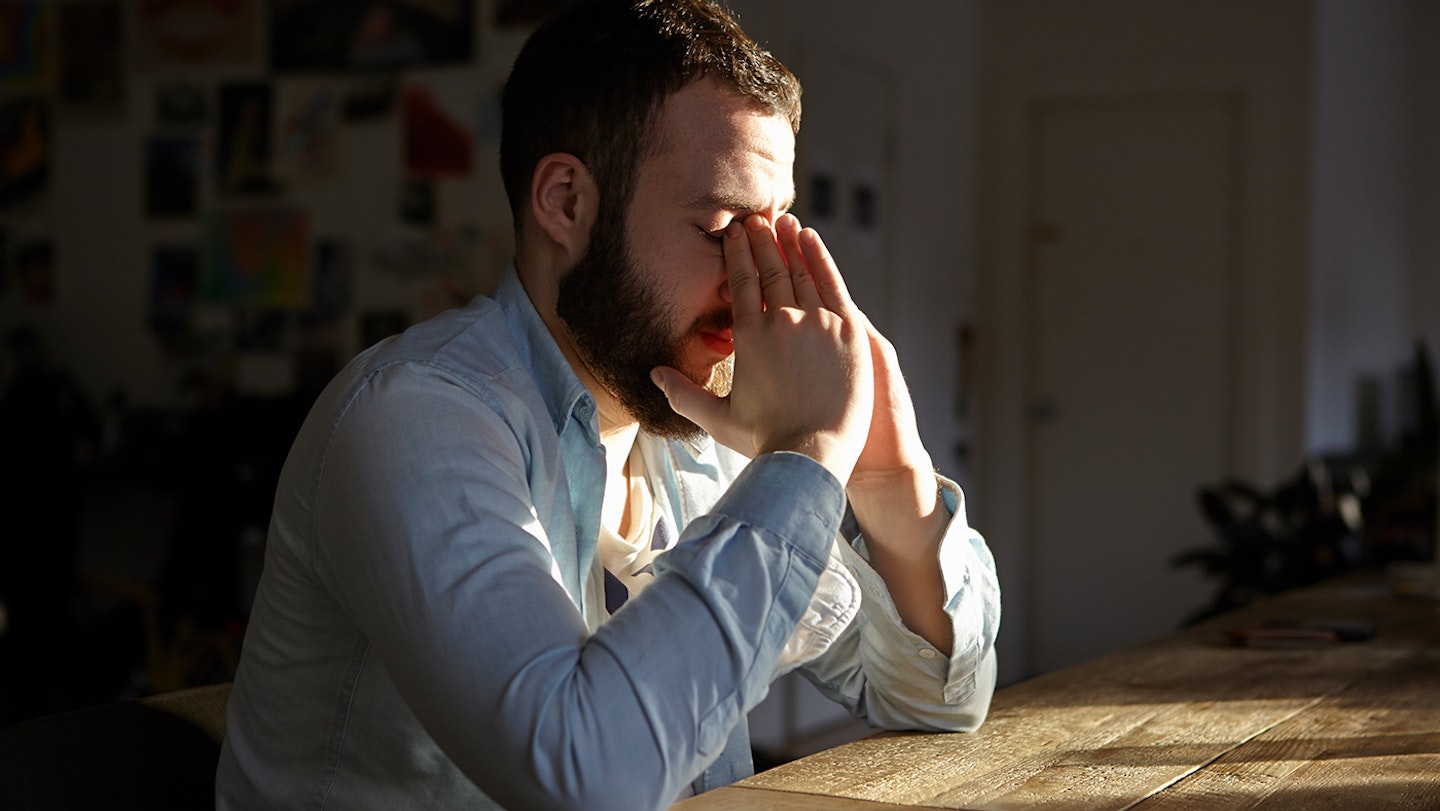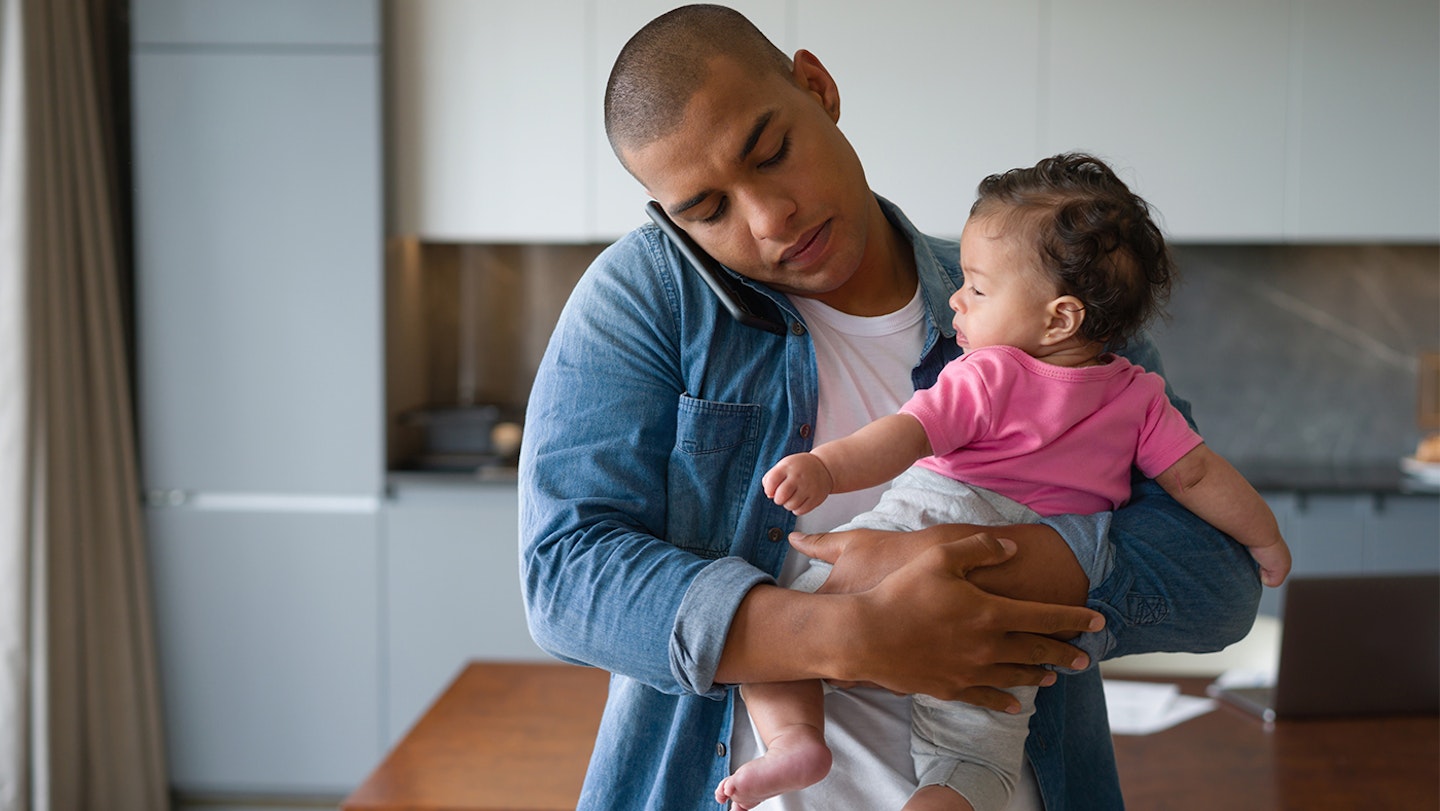Within the first year of a baby’s life, one in ten dads will suffer from postnatal depression. They might feel overwhelmed at first or start to feel low after a few months but most dads will suffer in silence because they feel ashamed about feeling depressed.
Why men might experience postnatal depression
Just like with postnatal depression in mums, the change to lifestyle and the extra responsibility of seemingly endless feeds and sleepless nights can soon catch up on you. Some dads feel that they don’t know how to support their partners and feel useless to them, with many often feeling like they can’t connect with their baby in the same way that ‘mum’ can.
"Men - like women - are more likely to be susceptible to experiencing symptoms of postnatal depression if they have certain vulnerabilities from childhood that predispose them to this," explains consultant psychologist and co-founder of The Chelsea Psychology Clinic, Dr Elena Touroni.
"If, for example, someone experienced a lot of emotional deprivation in their childhood, having a child themselves may trigger this past trauma. There might be other reasons too - for instance, if someone suffers from a lot of anxiety or if they’re the breadwinner and carry the responsibility of being the provider in the family. For some, there is also a sense of losing one’s partner as having a child can shift the dynamics in a relationship."
Postnatal depression in men will not necessarily occur if there is already maternal depression. "Of course, if there is maternal postnatal depression that will put a significant strain on the father," says Dr Elena. "But whether they themselves are prone to developing depression will have more to do with their own vulnerabilities rather than their partner."
What are the symptoms of paternal depression?
• Tearfulness
• Feeling sad and hopeless
• Low mood
• Sleeping difficulties
• Loss of appetite
• Problems concentrating
• Being easily irritated
• Not enjoying everyday activities
• Difficulties bonding with the baby
• Anxiety and panic attacks
Symptoms may come on gradually or they may happen all at once. If you are experiencing any of these symptoms or even ones not on this list, reach out to talk to someone.
Why does postnatal depression in men often go undiagnosed?
Even though things are starting to change, men are still generally less likely to seek the appropriate support. "With maternal postnatal depression, there are certain structures in place that provide support but when it comes to men, it isn’t always something professionals are looking out for," Dr Elena explains.

When to get help
• If their symptoms are interfering with their day-to-day functioning
• If they’re experiencing difficulties working and performing everyday tasks
• If they’re suffering pervasive low mood for an extended period of time
"These are all reasons to speak to your GP and discuss treatment options," recommends Dr Elena.
How is paternal depression treated?
Because paternal depression isn’t a diagnosis in itself, this means it falls under depression and is treated through psychological therapy predominantly.
"If it reaches the level of a mood disorder then we may consider antidepressant medication," says Dr Elena. "But generally speaking, the most important component rests in treating the vulnerabilities that led someone there."
"If someone suspects the roots of their depression stem from their childhood or if they’re having difficulties bonding with their baby, therapy can help them explore what impact becoming a father is having on them and help them work through it."
Self-help techniques
If someone is truly suffering then it is unlikely that self-help techniques alone will help them. "But increasing events which bring about a sense of wellbeing and enjoyment, ensuring they talk to their friends and family about what’s going on can help," Dr Elena recommends.
Likewise, ensuring that they have enough childcare support so that they and their partner are able to find time together as a couple.
"It’s also important to find ways they can reconnect to their identity before becoming a parent i.e. doing the things they used to enjoy whether that’s exercising, seeing their friends etc," Dr Elena says. "But ultimately, psychological therapy is what is likely to be of most benefit to them."

Support for postnatal depression in men
As well as your doctor or GP, there are lots of incredible mental health organisations that can offer support. These include:
• Mind
Real-life dad experience
We spoke to dad of one-year-old Leo, Dylan Yarborough, who opened up about his experience and how postnatal depression affected his life.

Dylan said he was delighted after the birth of his son and felt like he was "on cloud-nine for weeks". But when his son was five weeks old, he started having severe chest pains and was advised to go straight to A&E.
After some tests, he was given the all-clear and was asked a lot of questions about his general health and lifestyle. Dylan explained that he was under a lot of pressure from university deadlines and didn’t know how to support his partner who he could tell was struggling a bit.
The doctor then told him he had suffered from an anxiety attack and would be referred to his GP to see his doctor so that they could help Dylan and find him some support.
Dylan explained that he was usually a confident and outgoing person and had never suffered from anxiety before, but after his son was born he stopped wanting to see his friends as much. He thought that was normal for a new dad.
He went to his appointment a few days after his anxiety attack and it was then that he was told that he was suffering from postnatal depression.

“I thought that was something only mums struggled with, not dads. I didn’t tell anyone about my diagnosis because it made me feel less of a man. I didn’t think men could struggle and I thought it was just a bit of stress from work and adjusting to life with a newborn.”
Some days he struggled to get out of bed, he said, “I wanted to be the cheerful, loving boyfriend and father that I knew I was, but I couldn’t. I didn’t know why. I just hit a really low point and my relationship and motivation were suffering from it.”
With his permission, the GP set up weekly group sessions for Dylan to attend where he could speak to others with anxiety if he wanted to, and he could also listen to other peoples’ experiences.
“Speaking to someone about my depression and anxiety helped. I didn’t think it would, but it felt good to say what was going on in my mind out loud. I started a new job too and when I came home to see Leo’s smiling face I felt like I mattered.”
A year after his son was born, Dylan said that he has good and bad days: “trying to overcome depression was the hardest thing I’ve had to do but I’m starting to feel more like myself again”
“My commitment and love for my son can never be questioned through my battle with depression, I just felt like I wasn’t doing the best I could.”
Postnatal depression in men is not commonly talked about, but it affects both women and men equally, with some starting to call it ‘paternal depression.”
The signs of postnatal depression vary for mums and dads, but if you notice changes in moods or notice common signs, do not suffer alone. Speak to a friend, health professional or your partner about how you’re feeling.
You are not alone and there is always support out there whenever you may need it.
